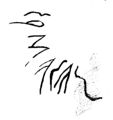VB·1: Difference between revisions
No edit summary |
No edit summary |
||
| Line 14: | Line 14: | ||
|orientation=0 | |orientation=0 | ||
|workmanship=scratched | |workmanship=scratched | ||
|condition=complete | |condition=complete, damaged | ||
|type_inscription=unknown | |type_inscription=unknown | ||
|language=Celtic | |language=Celtic | ||
| Line 31: | Line 31: | ||
Images in {{bib|Tibiletti Bruno 1966}}: 4 (detail photo) and 5 (drawing), {{bib|Morandi 1999}}: 169 (drawing) and {{bib|Morandi 2004}}: 548, fig. 11.45 (drawing). | Images in {{bib|Tibiletti Bruno 1966}}: 4 (detail photo) and 5 (drawing), {{bib|Morandi 1999}}: 169 (drawing) and {{bib|Morandi 2004}}: 548, fig. 11.45 (drawing). | ||
Damaged area right before the first letter, leading to variant readings ''uasamos'' (69, 309) and ''sasamos'' (117) in Bianchetti; {{bib|Kretschmer 1905}}: 98, no. 17, 103, and {{bib|Rhŷs 1913}}: | Damaged area right before the first letter, leading to variant readings ''uasamos'' (69, 309) and ''sasamos'' (117) in Bianchetti; {{bib|Kretschmer 1905}}: 98, no. 17, 103, and {{bib|Rhŷs 1913}}: 60 f., no. 17, have ''uasamos'', connected by the latter with the base {{m||u̯ađ-}} 'servant'. {{bib|Rhŷs 1914}}: 26 prefers ''sasamos'', but Whatmough {{bib|PID}} 305 reverts to ''uasamos'' (also {{bib|Pisani 1964}}: 284, no. 120); ''sasamos'' confirmed by {{bib|Tibiletti Bruno 1966}}: 8 (with discussion of the letter forms 6–8, see also {{bib|Tibiletti Bruno 1968c}}: 356, {{bib|Tibiletti Bruno 1975}}: 49, {{bib|Morandi 1999}}: 169, no. 13). | ||
See also '''{{bib|Piana Agostinetti 1972}}: 65, 272, tav. XXXI.9''', '''{{bib|Piana Agostinetti 1997–1999}} II: 35, in IV {{bib|Morandi 1999b}}: 302 f., no. 1'''. | See also '''{{bib|Piana Agostinetti 1972}}: 65, 272, tav. XXXI.9''', '''{{bib|Piana Agostinetti 1997–1999}} II: 35, in IV {{bib|Morandi 1999b}}: 302 f., no. 1'''. | ||
{{bibliography}} | {{bibliography}} | ||
Revision as of 20:01, 29 March 2024
| Inscription | |
|---|---|
| Reading in transliteration: | ṣasamos |
| Reading in original script: | |
|
| |
| Object: | VB·1 Ornavasso (bottle) |
| Position: | shoulder, outside |
| Orientation: | 0° |
| Direction of writing: | sinistroverse |
| Script: | North Italic script (Lepontic alphabet) |
| Number of letters: | 7 |
| Number of words: | 1 |
| Number of lines: | 1 |
| Workmanship: | scratched |
| Condition: | complete, damaged |
|
| |
| Archaeological culture: | La Tène D [from object] |
| Date of inscription: | first half of 1st c. BC [from object] |
|
| |
| Type: | unknown |
| Language: | Celtic |
| Meaning: | 'Sasamos' |
|
| |
| Alternative sigla: | Whatmough 1933 (PID): 305 Tibiletti Bruno 1981: 11 Solinas 1995: 129 Morandi 2004: 45 |
|
| |
| Sources: | Morandi 2004: 547 no. 45 |
Images
Commentary
First published in Bianchetti 1895: 117 f.
Images in Tibiletti Bruno 1966: 4 (detail photo) and 5 (drawing), Morandi 1999: 169 (drawing) and Morandi 2004: 548, fig. 11.45 (drawing).
Damaged area right before the first letter, leading to variant readings uasamos (69, 309) and sasamos (117) in Bianchetti; Kretschmer 1905: 98, no. 17, 103, and Rhŷs 1913: 60 f., no. 17, have uasamos, connected by the latter with the base u̯ađ- 'servant'. Rhŷs 1914: 26 prefers sasamos, but Whatmough PID 305 reverts to uasamos (also Pisani 1964: 284, no. 120); sasamos confirmed by Tibiletti Bruno 1966: 8 (with discussion of the letter forms 6–8, see also Tibiletti Bruno 1968c: 356, Tibiletti Bruno 1975: 49, Morandi 1999: 169, no. 13).
See also Piana Agostinetti 1972: 65, 272, tav. XXXI.9, Piana Agostinetti 1997–1999 II: 35, in IV Morandi 1999b: 302 f., no. 1.
Bibliography
| Bianchetti 1895 | Enrico Bianchetti, I sepolcreti di Ornavasso [= Atti della Società di Archeologia e Belle Arti della provincia di Torino 6], Torino: Paravia 1895. |
|---|




